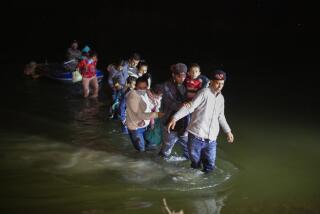INS Adopts Reforms on Custody of Minors
Concluding a long legal battle, the Immigration and Naturalization Service and civil rights attorneys based here unveiled an agreement on Tuesday designed to ensure that thousands of unaccompanied minors taken into INS custody each year are treated humanely and are quickly reunited with their families.
The settlement concludes a federal lawsuit filed in 1985 by immigrant advocates who alleged that the INS was wrongly locking up illegal immigrant minors alongside hardened criminals and was using the children as “bait” to arrest their undocumented parents.
The allegations received wide attention at a time when arrests of illegal immigrants were soaring to record levels and undocumented youngsters were increasingly being picked up after becoming separated from their parents or adult guardians.
The INS agreed to some reforms a decade ago, but the new settlement formalizes a standardized, nationwide policy governing the medical, educational and recreational needs of the many unaccompanied minors who continue to be arrested by immigration officers.
“We are committed to a humane and effective program to care for minors taken into INS custody without their parents or family members,” said INS Commissioner Doris Meissner.
The agency has already begun implementation and has embarked upon a nationwide training program, Meissner said.
*
However, Rosa Ehrenreich, a human rights advocate who authored a recent, highly critical report on INS child-custody procedures, expressed skepticism whether the agency would abide by the new requirements.
“We need something more than regulations that look good on paper,” said Ehrenreich, a Harvard professor who wrote the critical report for Human Rights Watch, a New York-based group that investigates rights abuses worldwide.
The Human Rights Watch report, released on April 10, alleges that the INS ignores both international and U.S. law in its treatment of minor detainees. Among other charges, Human Rights Watch accused the agency of failing to inform children of their rights and of blocking legal representation, neglecting to contact family members and keeping youths in “prison-like” conditions while failing to protect their emotional well-being.
The organization called for independent monitoring of INS practices and assigning care-taking responsibility to child welfare agencies, as is done in several European nations.
INS officials challenged the Human Rights Watch findings, and on Tuesday, Commissioner Meissner pointedly said that officials “continue to insist on the highest standards for our juvenile program.”
Under the settlement, the INS agrees to try to find detained juveniles’ family members or legal guardians in the United States and release the children to them while the youths’ cases are pending. The fact that the parents or guardians may be illegal immigrants does not make them ineligible to regain custody, officials stressed, nor will it subject them to arrest when they claim their children.
“We don’t use the person [minor] as bait,” said John Pogash, a long-time children’s welfare authority whom the INS recently hired as its juvenile coordinator.
If relatives or other designated “responsible adults” cannot be located, officials are committed to holding most minors in state-licensed child-care facilities--such as group and foster homes--that meet specific standards outlined in the agreement. The INS has pledged not to hold juveniles with unrelated adults.
In addition, the INS has agreed to provide juvenile detainees with structured classroom schooling--including instructional materials in their native languages--access to counseling and religious services, and notice of their rights under immigration law, along with a list of free or reduced-cost legal services. Detained minors will be permitted to to wear their own clothes, speak on the telephone, receive visitors in private, maintain their personal belongings and receive and send uncensored mail.
*
The INS arrested 2,028 unaccompanied juveniles in 1995, the last year for which figures are available, a spokeswoman said. Most were from Central America, Mexico or China. The majority were held less than 30 days, but in some cases, detention stretched on for months.
The settlement of the lawsuit, Flores v. Reno, involved extensive negotiations between INS attorneys and Los Angeles-based Center for Human Rights and Constitutional Law, which filed the suit in 1985 along with the National Center for Youth Law and the American Civil Liberties Union Foundation of Southern California.
Peter Schey, executive director of the center, vowed continued monitoring of INS compliance.
“We intend the hold the INS’ feet to the fire on this settlement,” said Schey, who is also litigating a broad class-action suit alleging constitutional violations of the INS adult detention program. “If they’re not in compliance, we will be knocking at the courthouse door fairly early.”
More to Read
Sign up for Essential California
The most important California stories and recommendations in your inbox every morning.
You may occasionally receive promotional content from the Los Angeles Times.










